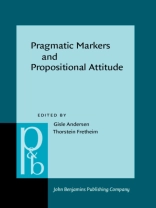In interactive discourse we not only express propositions, but we also express different attitudes to them. That is, we communicate how our mind entertains those propositions that we express. A speaker is able to express an attitude of belief, desire, hope, doubt, fear, regret or pretence that a given proposition represents a true state of affairs. This collection of papers explores the contribution of particles and other uninflected mood-indicating function words to the expression of propositional attitude in the broad sense. Some languages employ this type of attitude-marking device extensively, even for the expression of basic moods and basic speech act categories, other languages use such markers sparsely and always in interaction with syntactic form. Both types of language are examined in this volume, which includes studies of attitudinal markers in Amharic, English, Gascon, Occitan, German, Greek, Hausa, Hungarian, Japanese, Norwegian and Swahili. The theoretical emphasis is on issues such as interpretive vs. descriptive use of utterances or utterance parts, procedural semantics, linguistic underdetermination of the proposition expressed and the speaker’s communicated attitude to it, higher-level explicatures in the relevance-theoretic sense, the explicit – implicit distinction, as well as processes of grammaticalization and negotiation of propositional attitude in spoken interaction.
Andersen Gisle Andersen & Fretheim Thorstein Fretheim
Pragmatic Markers and Propositional Attitude [PDF ebook]
Pragmatic Markers and Propositional Attitude [PDF ebook]
ซื้อ eBook เล่มนี้และรับฟรีอีก 1 เล่ม!
ภาษา อังกฤษ ● รูป PDF ● หน้า 277 ● ISBN 9789027283740 ● บรรณาธิการ Andersen Gisle Andersen & Fretheim Thorstein Fretheim ● สำนักพิมพ์ John Benjamins Publishing Company ● การตีพิมพ์ 2000 ● ที่สามารถดาวน์โหลดได้ 3 ครั้ง ● เงินตรา EUR ● ID 4232067 ● ป้องกันการคัดลอก Adobe DRM
ต้องใช้เครื่องอ่านหนังสืออิเล็กทรอนิกส์ที่มีความสามารถ DRM












